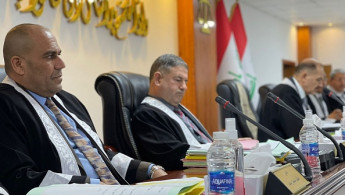Iraq plunges into a constitutional crisis, yet to elect a president
Iraq on Wednesday is plunging deeper into a constitutional crisis as the deadline by Iraq's Supreme Federal Court to elect a president was not met.
The country now faces various scenarios, commentators say, ranging from forming a pro-Iran national consensus government, holding fresh early elections, or an eruption of violence between political rivals.
On March 30, the Iraqi parliament failed for a third time to ensure a constitutional quorum of 220 lawmakers out of 329 to be able to elect a new president for the country.
The parliament postponed the session indefinitely after pro-Iran Shia parties and several Kurdish and independent lawmakers boycotted the sessions.
Iraq's constitution of 2005, drafted after the 2003 US-led invasion, does not have a process in terms of what happens when the parliament fails to elect a president within the constitutional period of one month after the first session of the newly elected national assembly.
Iraq held its first-ever early election on October 10 in response to mass protests in October 2019, which were triggered by rampant corruption by Iraq's ruling elites.
None of the political parties won enough seats to form a majority government, ensuring a deadlock between the political sides in terms of a consensus on power-sharing.
The Sadrist bloc headed by Shia cleric Muqtada al-Sadr won the largest share of votes with 73 seats, but he has so far could not collect an alliance of two-thirds to form a "national unity government" as he called for previously.
In a surprise move to ease the political stalemate, Sadr on March 31 decided to step back until the end of the holy month of Ramadan and give his Iran-backed rivals, the Coordination Framework that includes more than 100 MPs, the chance to form the country's upcoming government.
The Coordination Framework has yet to respond to Sadr's initiative. It has proposed forming the biggest parliamentary fraction among all the Shia parties, then electing a Kurdish president, and finally nominating a PM-designate in coordination with Sadr.
Pro-Iran Shia parties had also started negotiations with the Barzani's KDP and Sunni groups, who have already announced their adherence to their tripartite alliance with Sadr.
But Sadr, who in a tweet refused to make a consensus with pro-Iran Shia factions, is betting on the Coordination Framework's failure to form a government, or else, he said, he has no choice but to join the opposition.
An alternative option for Sadr is that he might form an emergency government, an option that was ruled out by Faiq Zidan, president of Iraq's Supreme Judicial Council, during an interview with Al-Sharqia News on April 3.
Eventually, Iraq's Supreme Federal Court may dissolve the parliament in order to pave the way for holding fresh general elections.
This is the second time that Iraq entered into a constitutional crisis, after the first 30-day constitutional period to elect a president expired in early February.
Iraq's Federal Supreme Court, Iraq's highest judicial authority, decided on 1 March that the Iraqi parliament can make another decision with an overall majority vote of its members to reopen nominations for the presidency.
According to the second provision of Article 72 of the 2005 Iraqi constitution, the parliament must elect the president within a maximum period of 30 days from their first session after the election.
The parliament held this session on 9 January and the period for electing the president expired on 8 February.
"One duty of Iraq's Federal Supreme Court is to prevent breaches towards the constitution, but unfortunately the court side-stepped the constitution in its recent decision," Latif Sheikh Mustafa, a constitutional legal expert and former Iraqi MP told The New Arab last month.
"The court should not have overridden its duties and breached the constitution to find legal exits to appease political sides," he added, further clarifying that "the best legal verdict would have been to rule out reopening the presidential nomination as unconstitutional in order to pave the way for fresh general elections, as is the case in many countries."





 Follow the Middle East's top stories in English at The New Arab on Google News
Follow the Middle East's top stories in English at The New Arab on Google News


